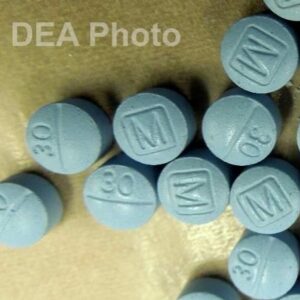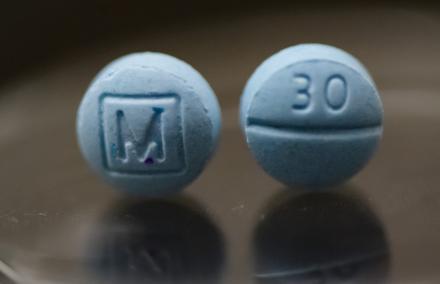The FDA and DEA issued warning letters in April to Wellerectile.com and Kubapharm.com, two websites selling what it claims are pharmaceuticals like green Xanax bars and Viagra pills, all without prescriptions. The sites are so sketchy, not only does the drug description at Kubapharm.com fail to tell consumers the drugs’ dosage, it also sources Wikipedia when listing its precautions.
The letters gave the sites 15 days to respond with the steps they will take in order to address violations. But according to Libby Baney, senior advisor with Alliance for Safe Online Pharmacies Global, those warning letters carry little weight. Both sites are still in operation, and that is why Baney believes the DRUGS Act needs to be passed.
The problem of counterfeit pharmaceuticals often made with the deadly drug fentanyl moved into the open during the COVID-19 lockdown. People who needed their prescription drugs, including older customers unfamiliar with internet commerce, went online rather than to their local drugstore. Knock-off versions of prescription drugs were popping up in Google searches made by unsuspecting customers.
In an effort to curb the sales of illicit drugs online, Sen. Marco Rubio (R-Fla.) introduced the Domain Reform for Unlawful Drug Sellers Act—better known as the DRUGS Act. The bill would require internet domain registrars like Verisign and GoDaddy to lock and suspend websites illegally selling drugs.
“We need to crack down on bad actors, including those from China, that target our youth and families with the online sales of counterfeit and illicit drugs like fentanyl,” Rubio said. “Without legislative action, this highly addictive drug will continue to fuel the growing opioid crisis in America.”
The DRUGS act was inspired by a voluntary, 120-day pilot program launched by the FDA in 2020 to help curb the sale of illicit drugs. Partnered with three internet registrars, the program shut down nearly 30 websites illegally selling opioids.
“Domain registrars are like the landlords of the internet,” Baney said. “They control the dot-coms and namespaces of websites. They have the ability to shut down bad tenants on those landing pages. Just like a landlord can’t keep a lease from a tenant using a house for drug trafficking, internet landlords should not be making money from criminals.”
As the bill is written, a trusted notifier like a state or federal agency or a chosen nonprofit organization would issue a warning letter to a site. The registrar would be notified and would have seven days to suspend the site.
Opponents of the DRUGS Act, however, fear it casts too wide a net and would cut off American customers from their medications.
Backed by the British Columbia government, Tim Smith, general manager of the Canadian International Pharmacy Association said his organization has a 20-year track record of providing patients with safe prescriptions and is worried the new legislation would strip approximately 2.3 million Americans of access to affordable prescriptions.
“There is a lot of room within the bill as it exists right now for subjectivity,” Smith said. “Let’s address opioids. Let’s address fentanyl. Let’s address falsified and substandard medications. If that’s what this bill intends to do then the way it is drafted should change. But in my reading of it, the words opioid or fentanyl don’t appear once.”
Jay Baldwin is a thyroid cancer survivor from Detroit. For the rest of his life—every day—he must take Synthroid. Even with insurance, Baldwin’s out-of-pocket expenses buying his meds in the U.S. would still be more than double paying full retail in Canada.
“I have saved thousands of dollars in the past 10 years by filling my prescription at a reputable Canadian pharmacy. That’s money I need to live on,” Baldwin said. “I am concerned that the legislation will be used to shut down reputable online pharmacy websites, especially considering the special interests backing these bills and their co-sponsors.”
Once a co-sponsor of the bill, Sen. Amy Klobuchar (D-Minn.) has withdrawn her support. Klobuchar previously authored legislation supporting the importation of prescription pills from Canada, and the Campaign for Personal Prescription Importation argued the DRUGS Act would also target pharmacies offering legitimate prescriptions.
According to Niamh Lewis with the National Association of Board of Pharmacy, three requirements are necessary for a pharmacy to operate legally in the United States. First, the pharmacy must have a pharmacy license in the state where it operates and the state where it dispenses. It must only sell prescription drugs that have been authorized for sale by the FDA, and it requires a valid prescription.
Technically, no states have measures on the books which would license pharmacies from Canada, and the FDA hasn’t approved drugs from Canada. However, the FDA is allowed discretion in permitting personal importation of drugs when the product is clearly for personal use and doesn’t appear to present an unreasonable risk to the risk.
With malicious sites selling fake medication, Gabe Levitt founded PharmacyChecker.com with Dr. Tod Cooperman to inform consumers which sites are offering safe prescriptions.
“There’s a middle ground on this issue,” Levitt said. “It has to do with patient-focused guidance on how to find the safest online pharmacies and avoid dangerous websites.”
But according to Lewis, without a valid pharmacy license, it is difficult for state regulators to directly investigate claims of patient harm and for patients to know if what they are getting is safe.
“We do not walk out of our neighborhood pharmacies and wonder if our drugs are safe and effective,” Lewis said. “We also rely on our well-regulated healthcare professionals to ensure drug therapies are correct for individual patients.”


